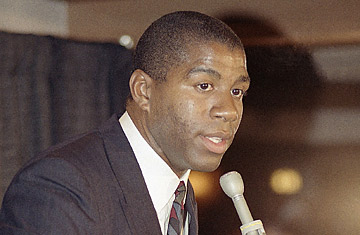
Magic Johnson announces that he is HIV positive on Nov. 7, 1991
Nov. 7, 1991, seemed like it would be a typical practice day for the Los Angeles Lakers. The season had just started, and the Lakers were trying to defend their Western Conference title, hoping to hang yet another championship banner atop the Great Western Forum. Yes, Michael Jordan and the Chicago Bulls had beat them for their first title that June, and looked to have the making of a dynasty. But the Lakers still had some leftover talent from the 1980s, the decade in which they won five championships. Guys like James Worthy, Byron Scott and, of course, Magic Johnson, had plenty of basketball left.
That morning A.C. Green, the iron-man Laker power forward who would eventually play in 1,192 consecutive games, an NBA record, was doing his prepractice stretching. Suddenly, Green says, Lakers coach Mike Dunleavy announced that instead of taking the practice court at Loyola Marymount University, the team would be heading over to the Forum for a mandatory meeting.
Weird, Green thought. He knew this meeting must be important. But when the Lakers arrived at the Forum locker room, the guys were still joking around, staying loose. That changed in a hurry, however. Before Johnson shook the world, he would shake his Laker teammates. "The meeting was turned over to Magic really soon," says Green. "He said, 'I want to talk to you guys first. And let you know what's going on first. I've contracted the HIV virus, and for right now, I know I'm going to have to stop playing. I might have to retire. We're trying to find out more.'"
To Green, these words had clear implications, and they had very little to do with the basketball court. "You were hearing that your teammate, your friend, your brother has this illness that, at that time, there wasn't a lot of recovery from," Green says. "It was more of a death sentence.'" Green's eyes began to dart across the room. "And now, the emotion, the impact of what he said just starts to settle," Green says. "The laughing, the jovial, the practical jokes being told and all that was going on before — now, you could hear a pin drop. Guys start to cry because of the magnitude of what he just said. Because you know there's nothing you can physically do for him to change the situation."
Later that day, Earvin "Magic" Johnson, then 32, stepped in front of the cameras to address the world. "Because of the HIV virus that I have attained," he said, "I will have to retire from the Lakers." That day, NBA commissioner David Stern, who sat next to Johnson at the press conference, should have been in Utah to announce that the 1993 All-Star game would take place in Salt Lake City. Instead, after hearing a quivering Lakers general manager Jerry West deliver the news over the phone the previous night, Stern — who, like many, thought Johnson was going to die — took an early plane from New York to Los Angeles. On the longest of flights, Stern, who still calls that day the worst of his tenure as commissioner, remembers "thinking about how people within our sport might react to the fact that I was heading out to LA to give someone support who was HIV positive, which had been demonized."
Johnson's former Lakers coach, Pat Riley, was in his first year coaching the New York Knicks. That morning, he was in his Madison Square Garden office, preparing for that night's game against Orlando. One of Johnson's confidants called him with the news. "I've had five or six of those days in my life that I remember where I was, what I was doing, when hearing about something in history," Riley says. "That was one of those days. It was an incredible feeling of sadness, worry and concern for him." Before that night's game, Riley led the New York City crowd in a prayer for Johnson. West, the Hall of Fame player who has detailed his battles with depression in a new autobiography, West by West, also took the news hard. "After I walked away from that press conference, I'll never forget it," says West. "I just went into my office and said, 'Ho-ly Christ.'"
Monday will mark the 20th anniversary of Johnson's announcement, a day which changed the course of NBA history and so much more. Johnson's career would be cut short, and fans were robbed of his artistry. (Johnson did return to the Lakers for a brief stint in 1996.) On a far more important level, Nov. 7, 1991, changed the debate about an epidemic that was still ravaging communities across the country. "It made people notice, for the first time, that you can get infected with HIV without being gay, without being a drug user, without being a sex worker," says Kevin Frost, CEO of amfAR, the Foundation for AIDS Research. "A lot of people took notice, and that changed the perception of how people got infected, and who was at risk."
